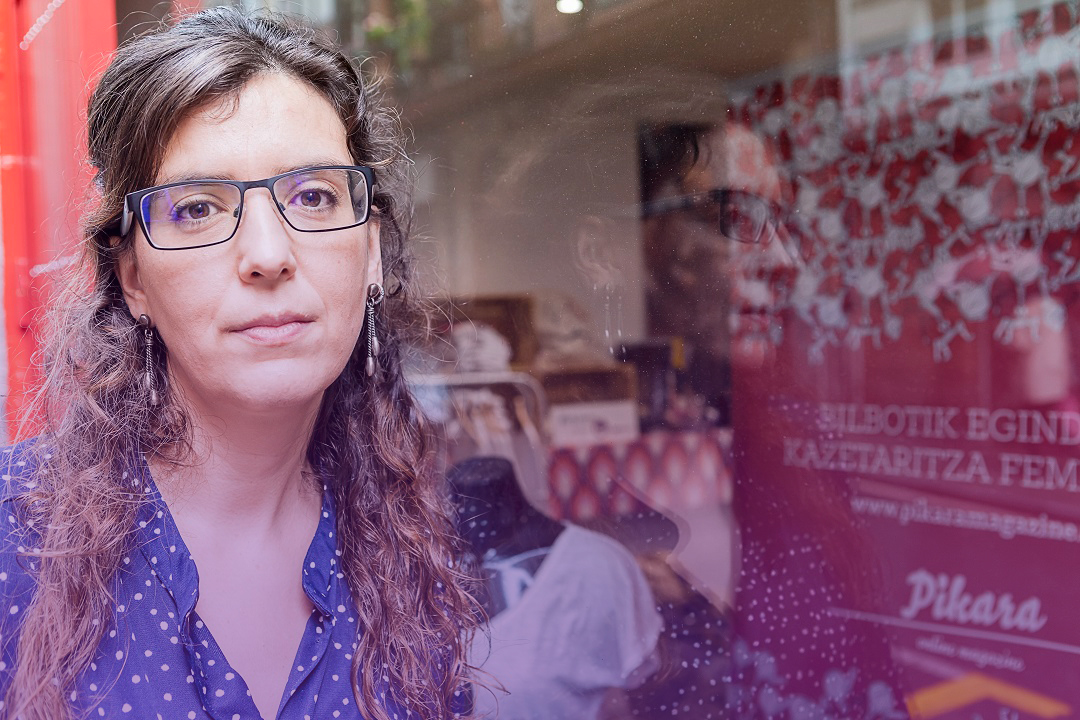Pikara Magazine is a feminist publication based in Bilbao, in the Spanish state, and it has been active since November 2010. “It is a feminist outlet born out of the idea of creating a web portal to publish articles that did not have space for them anywhere else 12 years ago,” María Ángeles Fernández, one of its coordinators, says.
María Ángeles says Pikara emerged in a moment when new spaces were necessary to report and propose reflections coming from feminism. “Saying we were feminists and were doing feminist journalism was a really bold thing to do. I always say the need we had to write about different things, with different topics and outlooks, was also a need to read. This is why readers quickly welcomed us,” she argues. Pikara has crossed national and regional borders and is currently read by feminists from several parts of the worlds, especially Latin America.
María Ángeles has been with Pikara since the beginning: she joined the project in its first month as an outside collaborator, publishing her writings and generally supporting editors as a form of activism. In this interview granted to Capire, she talks about Pikara’s current communication strategies, especially addressing their latest issue dedicated to feminist digital economy, published in early 2023. This issue was part of a process of reflections and contributions for the 8th Congress of Feminist Economy held in Barcelona, in the Spanish state, March 16-18, 2023.
What was the editorial team’s initial assessment and goal when they proposed an entire issue dedicated to feminist digital economy? Can you talk about how this is connected to the Congress of Feminist Economy?
The magazine is web-based, but we have some print products. We produce print yearbooks about general topics, like literature or economics, but we also produce four print issues a year about a specific topic. Two years ago there was the 7th Congress of Feminist Economy in Bilbao. We contacted the organizers to do a themed dossier, to cover them during the congress, which was held in the city where we live. As a result of this experience, which was really positive, we were now contacted to launch a new proposal and do a dossier covering the 8th Congress.
The issue is focused on digital economy because we have done an issue on feminist economy in general—and this year the organization was really more focused on digital economy. The first dossier was mostly dedicated to the concept of care, so now we wanted to address feminist digital economy, which is also a topic we are concerned about and work with.
We are completely free to work on these topics. We had a meeting with congress organizers to see what sisters would take part in it and what topics were going to be discussed, but also so that we could be able to address the topics we would like to critically discuss.
What contributions from feminist economy to the struggles for new digital paradigms would you highlight? How do you see this deeper debate about digital economy promoted by feminism?
In recent years, feminism has been very clear about the importance of the digital. Cyberfeminism has been discussed for a long time, and theories with many contributions from technofeminism have been formulated about how technology makes feminisms more complex. Pikara was born at the height of social media and that has definitely helped it have more visibility, reach other territories, and have greater exposure. We cannot ignore that, but we also have to ask a few questions. On the one hand, we have feminist activism on social media, but we also have the internet as a control mechanism.
There is a very interesting interview with Thais Ruiz de Alda of DigitalFems, a feminist data analysis project. She talks about what is stolen from us on the internet and explains what these data are for. She also looks into the entire process of the internet industry, its birth as a space and its co-optation and control by certain sectors of power. She talks about existing tools and what is being done to take the internet away from corporate hegemony. For the past two or three decades, the possible contributions of the internet have been increasingly cornered.
We are getting into an increasingly digital economy. It is affecting the bodies of the most vulnerable people—and it is not a coincidence that they are migrant and racialized women—both in terms of working hours and when we think about the apps used to hire domestic workers, and in the places from where the resources are extracted to generate electricity.
Can you elaborate on how these pillars—work and extractivism—are updated in terms of digitalization?
Two years ago, speaking with colleagues, we saw how platforms were being used as a new source of jobs. Uber is one example, with its exploitation of labor and the lack of rights, which was simultaneously creating a lot of new very precarious jobs, with no room for labor struggle or the union of workers.
We see how this happened with domestic workers. In Spain, the people responsible for domestic and care work are migrant—often undocumented—women, which puts them in a very vulnerable and precarious situation. Platforms were created with no accountability, connecting these women who need jobs to survive with people who need someone to clean their houses or care for their dependents. These platforms make these jobs more precarious, because there is no longer an employer or company who hires you and from whom you can demand your rights. It’s a platform that operates somewhere you don’t know. On the other hand, alternatives have emerged: while these platforms of casualization and loss of rights emerge, others emerge based on cooperativism, in which the workers themselves come together to do things themselves, controlling the app or the technologies that enable these connections.
By the way, we have recently published an article on the Pikara website about a Brazilian cooperative of women delivery workers called Señoritas Courier, showing how they handle the logic of horizontal relationships and care with workers’ rights, and the exclusion affecting Black and trans people.
And there is also the aspect of extractivism. We have this idea that reading an online magazine or book has no impact, but it really does. Online resources need electricity: to turn on the computer, to send an email, to make a video call, to download a file. This flow of information and movement is increasingly physical.
Wanting to be online has a physical impact, it is material. Data centers are located away from us and we don’t see them, but they exist and require a lot of power to remain refrigerated and operational.
They are huge machines in computing center operating 24/7, processing millions of pieces of information. Where does all that power come from? In what conditions? From what territories? And who controls our data? We rely on technology for everything in our lives, from doing an interview to getting tickets to the movies, buying a book, or doing banking operations.
We have created our own media outlet so that we don’t depend on the Spanish state’s big news companies, the masters who say how what headlines should be published, or if this or that topic is important or not. But in the end, we are in the hands of rich and racist US masters. We feed them by using their tools, and we are in their hands, and they decide how algorithms work, for example.
Do you consider that looking at the material aspect of the digital is strategic to rethink social structures in general?
I think so. We are living a moment of global energy and economic transition—at different paces in different territories. In the Spanish state, we are transitioning to renewable energy sources. But if this transition is carried out without questioning consumption, where power comes from, and whether this level of consumption is necessary, we will not be transitioning. We will be changing the technology, but we will be not be challenging the structure that has led us to a system that is collapsing. We are using new forms of communication, without questioning what is behind it.
To speak of these impacts is to speak of geopolitics. What happened in Peru and other territories is not a coincidence—it directly points to the lithium triangle and the conflicts involved in controlling these resources. In the Spanish state, mining has boomed in the past five years, it’s brutal. We are seeing a new process of expansion of extractivist borders. This has to make us question our way of living. We can no longer look the other way. As feminists and as a feminist news outlet that challenges the sectors of power, we have to question the entire logic behind those impacts. These are purely capitalist companies, ever bigger conglomerates in the hands of a few who will decide over our lives, our information, our data, our conversations, our tastes, our consumption.
Feminist communications go hand in hand with the digital, but there is also a relationship with feminist economy and its proposal of change. How can we produce communications that follow and strengthen this horizon to overcome digital capitalism?
I really believe in journalism as a counter-power tool, that challenges all sectors of economic, patriarchal, and racist power. This is why I believe feminist journalism is a better journalism: because it broadens our views and the critiques of the system, it expands questions and horizons. I think that the issue of digital economy is something like this: to clearly see that all these sectors of economic power are behind it so that we can rethink things and see that nothing is neutral, nothing is zero impact. Actually, artificial intelligence is an issue that is out of control, but people around the world are saying, “we are going to stop this, it is going too fast and we need to think about its implications.”
What are Pikara’s current challenges and next steps?
There was a boom of visitors reading the magazine at the height of the pandemic, which happened here in the Spring 2020, when we were under lockdown. The consumption of reading materials then became saturated, so there was a decrease in reading last year. At first, we were worried about our situation, but as we talked to colleagues from other outlets, we realized it was a general thing: people are reading much less. On the other hand, we have more subscribers than ever supporting our work.
Facebook was the networking site where people read the most, while other sites, like Instagram, are not reading networks—they are focused on seeing pictures. Even though we have more followers there or many likes and shares in our pictures and stories, at the end of the day that does not lead to people reading our website. This is one of my hypotheses. What we are trying to do is have a more direct contact with readers through newsletters and our Telegram channel. Doing themed print publications is another way of doing that. We are looking for different ways to reach people.
I want to encourage people to read, because it’s fundamental. You don’t have to read everything, but there are always topics that may interest you. In the fast-paced world we live, having the space to read is always a pleasure and a necessity.
It’s an intimate moment with the text, whether it’s a novel, an essay, or a news article. I believe we have to reclaim these spaces for our own sovereignty—“I decide what I read, I don’t just read anything that pops up in front of me.” I think this is also a small disruption of the system. Sometimes, the whirlwind of life takes us to different paths.




